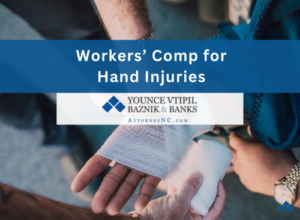Can I File a Workers’ Comp Claim for a Hand Injury in North Carolina?
You can file a workers’ comp claim for a hand injury in North Carolina if the injury is from an accident that happened at work while you were doing your job. Even if your injury got worse over time, such as from repetitive motion, you could still qualify for benefits. However, your job duties or environment must have caused your injury and put you at increased risk of developing the condition compared to the general public (N.C. Gen. Stat. § 97-53; Rutledge v. Tultex Kings Yarn, 308 N.C. 85, 93, 301 S.E.2d 359, 365 (1983) and Booker v. Duke Univ. Med. Ctr., 297 N.C. 458, 471-72, 256 S.E.2d 189, 198 (1979)).
If you hurt your hand while using tools, lifting heavy items, or doing any other job-related task, you should report the injury to your employer within 30 days. Most employers must have workers’ comp insurance if they have at least three workers. It doesn’t matter if you work full-time or part-time. It also doesn’t matter how long you have worked there.
If the insurance company tries to deny your claim or delay payments, a lawyer can help you take the next steps and protect your rights.
Workers’ Compensation Benefits for Hand Injuries
If you suffer a hand injury on the job in North Carolina, workers’ comp could provide different kinds of benefits depending on the severity of your injury, how long it affects your ability to work, and whether you heal fully. These benefits fall into a few categories, each serving a different purpose.
Medical Treatment Benefits
Workers’ compensation benefits will pay for all reasonably necessary medical care related to treating your workplace hand injury. That includes doctor visits, surgery, physical therapy, and prescriptions. You must see doctors approved by your employer or their insurance company, although you may ask for a second opinion if you wish. It also compensates you for travel to your appointments if it is more than a 20 mile round trip.
Temporary Total Disability (TTD) Benefits
If your doctor says you can’t work at all while your hand heals, you might qualify for TTD benefits. These benefits replace up to two-thirds of your average weekly wage, up to a statewide cap for that year. You only get these payments after your first seven days of missed work unless your disability keeps you out of work for more than 21 days.
You can keep getting these payments while your doctor continues to say you’re unable to work. However, the state limits how long you can receive temporary benefits to a total of 500 weeks in most cases.
Temporary Partial Disability (TPD) Benefits
If you return to work but can’t do your usual job and earn less because of your hand injury, you might qualify for TPD benefits. These payments replace two-thirds of the difference between what you earned before and what you are limited to earning now as a result of your injury. For example, if you used to earn $1,000 a week but now earn $700 due to reduced capacity, you could receive two-thirds of the difference in weekly benefits, which is $200.
Permanent Partial Disability (PPD) Benefits
If you are still partially impaired once your doctor says you’ve reached “maximum medical improvement” (MMI), you may be eligible for permanent partial disability (PPD) benefits. The amount and duration of these benefits will depend on factors such as the rating your doctor assesses for permanent disability and what part of your hand is injured (whether it is the whole hand or one finger). This benefit can apply even if you return to your old job.
Permanent Total Disability (PTD) Benefits
If you lose both hands, you could qualify for permanent total disability (PTD) benefits. These payments equal two-thirds of your pre-injury average weekly wage, subject to the state’s maximum rates. Unlike temporary benefits, PTD benefits have no time limit. You could receive them for the rest of your life.
Vocational Rehabilitation
If your hand injury keeps you from returning to your old job, but you can still work in another role, you might qualify for vocational rehabilitation benefits. These benefits provide job retraining, education, and other support to help you return to the workforce.
In North Carolina, you can ask for these services if you can’t earn at least 75 percent of what you earned before your injury. A rehabilitation plan might include help with a job search, college classes, or learning a new trade.
 Are you having trouble using your hand after a job injury? Are you unsure if the insurance company gave you a fair offer? The workers’ comp team at Younce, Vtipil, Baznik & Banks, P.A. can help. We know how to deal with denied claims, low ratings, and settlement offers that don’t add up.
Are you having trouble using your hand after a job injury? Are you unsure if the insurance company gave you a fair offer? The workers’ comp team at Younce, Vtipil, Baznik & Banks, P.A. can help. We know how to deal with denied claims, low ratings, and settlement offers that don’t add up.

















